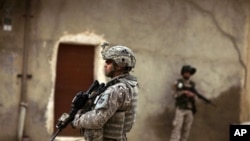U.S. officials and legislators say they are cautiously optimistic about Iraq’s ability to survive as a functioning democracy with reasonable levels of stability and security after the United States completes a troop withdrawal from the country by year’s end. The future of U.S.-Iraqi cooperation was the focus of a Senate Foreign Relations Committee hearing this week on Capitol Hill.
After hundreds of billions of dollars invested in Iraq and thousands of American lives lost, the final departure of U.S. troops will signal the completion of a major military endeavor and the beginning of a new test for both nations. Testifying before Congress, U.S. Ambassador to Iraq James Jeffrey spoke of the task ahead.
"We will either step up to the plate, finish the job, and build on the sacrifice made,” Ambassador Jeffrey said. “Or we will risk core U.S. national security interests, be pennywise and pound-foolish, and cede the field to al-Qaida and other dangerous regional influences."
The ambassador spoke of a window of opportunity to ensure that Iraq becomes, what he termed "a force for stability and moderation in a troubled region".
"We cannot afford to let the gains we have sacrificed too much for slip away," he added.
As the last American troops depart Iraq, the U.S. civilian staff is expected to more than double to help promote economic development and Iraqi security capabilities.
Safety concerns
A Senate committee report expresses concerns for the safety of U.S. personnel without military support. But the situation in Iraq looks encouraging, according to the chairman of the Senate Foreign Relations Committee, Democrat John Kerry of Massachusetts.
"Significant progress has been made in Iraq in the past four years,” said Senator Kerry. “More than 100,000 American troops have been withdrawn, and the security situation, though sometimes strained, has not unraveled. Forming a government [in Iraq] was obviously a long and contentious process. But the political factions kept their commitment to negotiation over violence."
US assistance
Senators of both parties pledged to fund expanded U.S. civilian efforts in Iraq. Senator Richard Lugar is the ranking Republican on the committee.
"Our ideal for Iraq is that it becomes a stable, pluralistic society that enjoys a genuinely representative government, maintains a self-sustaining economy, and cooperates with the United States and other like-minded nations to resist aggression and terrorism," said Senator Lugar.
Lugar said Iraq must rebuild its oil infrastructure and expand petroleum exports. He said a boost in oil revenue will enhance Iraq’s finances and its stability.
Progress
The commander of U.S. forces in Iraq, General Lloyd Austin, says Iraq is building on an increasingly stable foundation.
"Today, Iraq has the most-inclusive government in their nation’s history,” said General Austin. “And the security environment is the best it has been since 2003."
Observers acknowledge these gains, but some question Iraq’s ability to sustain them without a foreign troop presence. Foreign affairs analyst Michael O’Hanlon.
"Iraqis really have made amazing headway,” O’Hanlon said. “The problem is, they [Iraqis] are still not that far away, not that far removed, from a very destructive civil war, and, of course, from a very destructive Saddam Hussein regime prior to that."
O’Hanlon says Iraq would be wise to embrace a multi-national military presence, perhaps one authorized by the United Nations.




